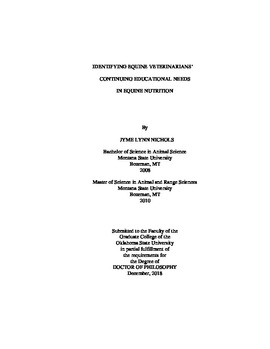| dc.description.abstract | A growing population of horses is suffering from nutrition-related disorders (Hoffman, Costa, & Freeman, 2009). Horse owners rely on equine veterinarians as their primary source of information regarding the health, disease prevention, and nutrition of their animals (AAHA, 2003; Bushell & Murray, 2016; Hartmann, et al., 2017; Laflamme et al., 2008; Martinson et al., 2006; Michel et al., 2008; Murray et al., 2015; Swirsley et al., 2017; USDA, 2015; USDA, 1998). After thorough review of the literature, it appears needs assessments of equine veterinarians in the United States is lacking in the area of equine nutrition. The aim of this study was to identify educational needs in equine nutrition of licensed veterinarians in the United States using the Borich (1980) needs assessment model. This study was framed by the human capital theory, which is centered on a person's acquisition of knowledge, skills, abilities, experiences, and education (Becker, 1964; Coff, 2002; Little, 2003; Shultz, 1971; Smith, 2010; Smylie, 1996). Results of this study found veterinarians rank themselves highly as a nutritional resource, outranking every source of equine nutrition except a PhD equine nutritionist. Veterinarians appear to have a lack of respect for university faculty and very little desire to participate in research related to equine nutrition. Veterinarians reported low confidence levels in equine nutrition when leaving veterinary school and have a lack of desire to pursue continuing education in the field of nutrition. Veterinarians are more likely to participate in continuing education offered online. Stakeholders should consider increasing veterinarians' awareness of the increase in human capital that will occur by improving a skill set such as equine nutrition knowledge. Curriculum should be enhanced regarding the role nutrition plays in the following categories: arthritis/joint pain, insulin resistance, equine gastric ulcer syndrome, equine metabolic syndrome, and performance horses. Veterinarians also should be taught how to assess nutritional status during a general wellness examination. | |
